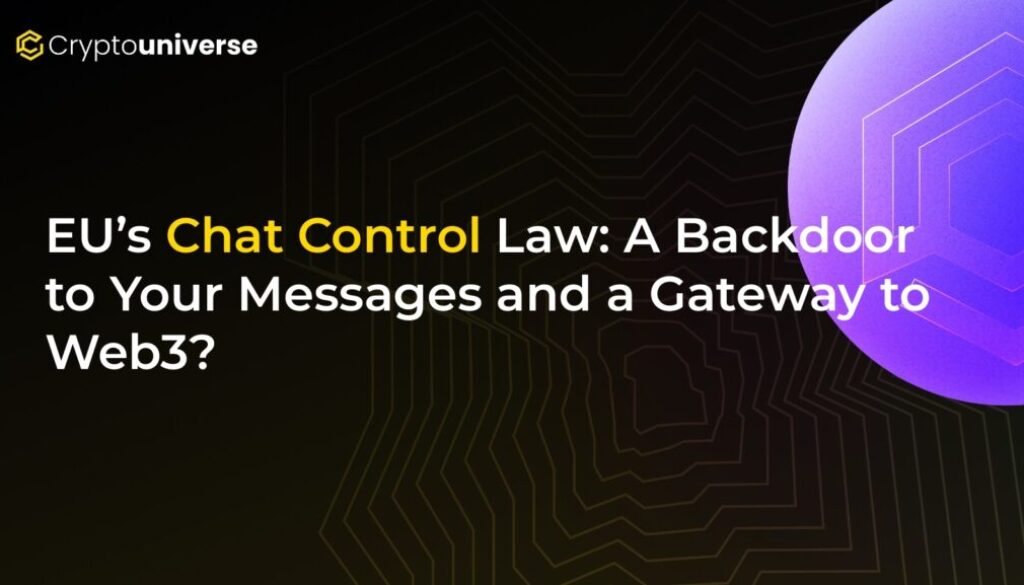EU’s Chat Control Law: A Backdoor to Your Messages and a Gateway to Web3?

A Digital Crossroads: Europe’s Fight Over Privacy and Security
The European Union is on the verge of a landmark decision that could forever change the landscape of digital communication. A controversial new law, known as “Chat Control,” is being debated, and privacy experts are sounding the alarm. They warn that this legislation, designed to protect children, could shatter the very foundation of online privacy, break end-to-end encryption, and inadvertently push millions of users toward the decentralized promise of Web3.
At the heart of the issue is a fundamental conflict: how do we protect the vulnerable without creating a system of mass surveillance? The EU’s answer, the Regulation to Prevent and Combat Child Sexual Abuse, has ignited a firestorm of criticism for proposing a solution that many believe is worse than the problem it aims to solve.
What is the “Chat Control” Law?
On the surface, the law’s goal is noble. However, its proposed method is what has privacy advocates deeply concerned. The legislation would compel tech companies and messaging platforms to scan all private digital communications, including messages, photos, and videos, for illegal content.
The most contentious part? This scanning would happen before the messages are encrypted and sent. This technique, known as “client-side scanning,” effectively places a surveillance tool directly on every user’s device. Critics argue this creates a universal backdoor into what we believe are our most private conversations.
“Giving an inherently corruptible entity nearly unlimited visibility into the private lives of individuals is incompatible with an honest value statement of digital privacy,” warns Hans Rempel, co-founder and CEO of Diode, calling the proposal a dangerous overreach.
Breaking Encryption and Breaching Trust
End-to-end encryption is more than just a feature; it’s a mathematical promise that only the sender and the intended recipient can read a message. The EU’s
A Legal and Technical Nightmare
Experts point out that the law stands on shaky legal ground. Elisenda Fabrega, general counsel at Brickken, notes that the proposal is “difficult to justify under the existing jurisprudence of the Court of Justice of the European Union.” She highlights that it appears to violate Articles 7 and 8 of the EU Charter of Fundamental Rights, which explicitly guarantee the confidentiality of communications and the protection of personal data.
“Client-side scanning would enable the monitoring of content on user devices prior to transmission, including in cases where there is no indication of unlawful activity,” Fabrega explains.
The potential for misuse is also a major concern. “There are no guarantees,” Rempel adds, pointing out that “over 10% of all data breaches occur in government systems.” Creating a tool for mass scanning could make it a prime target for malicious actors and authoritarian regimes.
The Unintended Consequence: A Mass Migration to Web3
As trust in traditional digital platforms erodes, where will users turn? Experts believe the answer is Web3. If mainstream messaging apps are forced to become extensions of state surveillance, privacy-conscious individuals will seek out alternatives built on a different philosophy.
This is where decentralized technologies shine. Web3 platforms are designed from the ground up to protect user data and uphold privacy through cryptography and user-controlled systems.
“Web3’s privacy battle cry is ‘Not your keys, not your data,’” says Rempel. “This is true self-custody for data.” He emphasizes that in a Web3 model, the end-user maintains complete control and sovereignty over their information from “cradle to grave.”
Fabrega agrees, stating that if the law passes, “privacy-conscious users will increasingly explore decentralized Web3 alternatives.” This shift, she warns, could fragment the European digital market and undermine the EU’s position as a global leader in privacy standards—a reputation it built with regulations like GDPR.
The Deciding Vote: All Eyes on Germany
The fate of the
While experts like Rempel believe the likelihood of it passing is “low,” he cautions that the fight is far from over. “It won’t be the last time that there is an attempt to subvert fundamental human rights in the name of safety.”
The outcome of this vote will send a powerful message about the future of digital freedom in Europe and beyond. Will it be a future of compromised privacy, or one where users take control of their digital lives, potentially accelerating the world’s transition to a more decentralized web?


